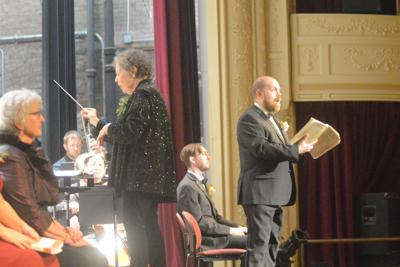As several members of the audience mentioned, Friday’s Vermont Philharmonic performance of Handel’s “Messiah” didn’t enjoy quite the “atmosphere” of its usual location, Montpelier’s very gothic St. Augustine’s Roman Catholic Church. (The church hasn’t entirely recovered from this summer’s flooding.) Still, the spirited and uplifting performance of George Frederic Handel’s masterpiece resonated throughout the Barre Opera House (and the seats were a lot more comfortable). The program was repeated Sunday afternoon also at the Opera House.
Assistant Conductor Lisa Jablow led the Vermont Philharmonic and Chorus in a rich and heartfelt holiday performance. While not the three-hour-plus complete version, like most Christmastime performances, Part 1 (Christmas) and the “Hallelujah Chorus” from Part 2, were performed, along with six selections from Part 3, including the final “Amen.”
And for the second year, Jablow chose Wolfgang Amadeus Mozart’s orchestration which adds flutes, clarinets, French horns and trombones, creating a Classical orchestra rather than Handel’s Baroque original. That brought the orchestra’s size to 30, as opposed to the usual 24. Still, the instrumentalists never overpowered the chorus of some 36. Nor was the orchestration heavy: despite a somewhat different flavor, Handel would have easily recognized his masterwork — indeed, may in the audience weren’t aware of any difference.
Although somewhat female-heavy, Mad River Chorale Director Mary Jane, who prepared the chorus, crafted a cohesive and potent ensemble of the volunteer singers of many different levels. From the brilliant and rich “And the Glory of the Lord,” to the light and crisp “For unto us a child is born,” to the sheer brilliance of “Glory to God,” to the power and grandeur of the final “Worthy is the Lamb, Amen,” the choruses were the highlight of the evening delivering the joy of “Messiah.”
Jablow’s approach, brisk but not the racing-to-the-end period style, was lyrical and expressive, enjoying the power of this beloved music. Despite some initial scrappiness, the members of the community orchestra quickly came together to enjoy Mozart’s take on the Handel. Notable were concertmaster Joanna Alpízar’s silky violin solos, cellist Deborah Black’s expressive continuo in the recitatives, flutist Laurel Ann Maurer’s singing flute obbligato in the arias, and Ban Marcy’s brilliant trumpet in “The trumpet shall sound.” (Don Wheater performed the solo on Sunday.)
The performance introduced two new vocal soloists. Soprano Cristina Escobedo, a native of Peru, proved brilliant but mellifluous in her four recitatives, beginning with “There were shepherds abiding in the field,” and the aria “Rejoice greatly, O daughter of Zion,” among others. Despite some early fuzziness, baritone Mason Jarboe, who has performed with Brandon’s Barn Opera, delivered the power of “For behold, darkness shall cover the earth” and haunting quality of “Behold, I tell you a mystery.”
Veteran Vermont tenor Adam Hall revealed his expertise, brilliantly and effectively delivering “Comfort ye my people” and “Every valley shall be exalted.” Mezzo-soprano Linda Radtke, host of Vermont Public’s “Choral Hour,” sang with a gentle lyricism throughout, most notably in the recitative “Behold a virgin shall conceive” and the ensuing aria with chorus, “O thou that tellest good tidings to Zion.”
Friday’s audience was smaller than usual, perhaps because of the (temporary) loss of the church. Interestingly, Handel wrote “Messiah,” not for the church, but the concert hall. Those that attended certainly enjoyed the performance.


